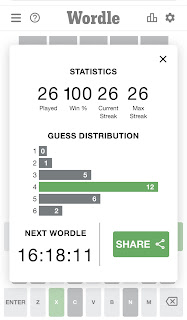 |
Cover of 'Have you eaten Grandma?'
by Gyles Brandreth |
I was considering writing a review of this book,
Have you eaten Grandma? by Gyles Brandreth, but to be quite honest it's not worth bothering.
[Edit: I ended up writing a review of it anyway so here you go.]
It's neither surprisingly good nor toe-curlingly awful. I got it for professional purposes (I'm teaching a module on 'Grammar for Everyone' this term and want to look at all sorts of books that claim to be about 'grammar') and I'll get something out of it for that, I suppose, but I'm glad I didn't buy it for pleasure.
I had been ready to be cross about it after seeing
this little video in which Gyles (known as being a pedant, has done truly awfully smug programmes about language in the past) talks about some of his 'bugbears' including redundant
myself,
can I get rather than
may I get, and so on. In fact, it's exactly what you expect.
The majority of it is punctuation advice. It's fine, with only a few mistakes, but
Eats, Shoots and Leaves is better if that's what you want. Then there's lists of words, either just ones he likes or ones that people often get wrong in writing (
accept vs
except, for instance) and mnemonics (sometimes very weird ones) to help remember them.
He has a bizarre joy in some -- but not all -- neologisms. He seems to have (like Stephen Fry) come around from pure prescriptivism to the joys of what he calls 'slang' some time in the 1990s, and so he loves things from then. He's constantly saying
End of, for example, like at the end of the video above. He gives a long list of initialisms like WTF (which he loves) and describes some of them as being of 'the Whatsapp and Snapchat generation', which needless to say were totally unfamiliar to the teenager I asked. And yet he is so rigidly inflexible about some things that he was taught were correct, and so are immutable rules for him (you mustn't ever, ever say
bored of, for example, despite the fact that there's no harm in it whatsoever and millions of people do say it).
There's an embarrassing section of the abbreviations part where he talks about labels for gender and sexuality that verge on poking fun at LGBTQIA-type initialisms. He shows a clear support for non-binary, non-straight identification, but still betrays an opinion of 'simply straight' being 'normal' and 'knowing where you are'. The section on American vs British English is terrible, and relies only the books of people like him, not linguists. This is not a book that seeks to promote truth.
This is very evident throughout, when he often refers to 'the Brandreth Rule' on particular points. This means that he knows that there are different ways of doing things, and his arbitrary choice is the one he likes the best. That's what this book is. It's for people aged about 50 or 60, who 'love the English language', and just want someone who agrees with them to reinforce their opinions and tell them the things they already know so that they can be smug about knowing them. I've come to realise that anyone who says they 'love the English language' doesn't really love the English language, not as it really is. They love some idealised version of it, the version they speak, the version they think is 'best', and which is being 'corrupted' by Americans, kids, foreigners, or modern education.
It's a perfectly acceptable, slightly dull book. If you want to learn some stuff about punctuation or commonly confused words, then it's one way of doing that (but not the best way). If you just want an authority to refer to on certain style points, it'll do that (but there are better authorities to refer to). It's not the best of any of the things it does, but it is by Gyles Brandreth, and that is its selling point. End of. (Sorry, that was such a lazy way to end this but I couldn't resist.)









